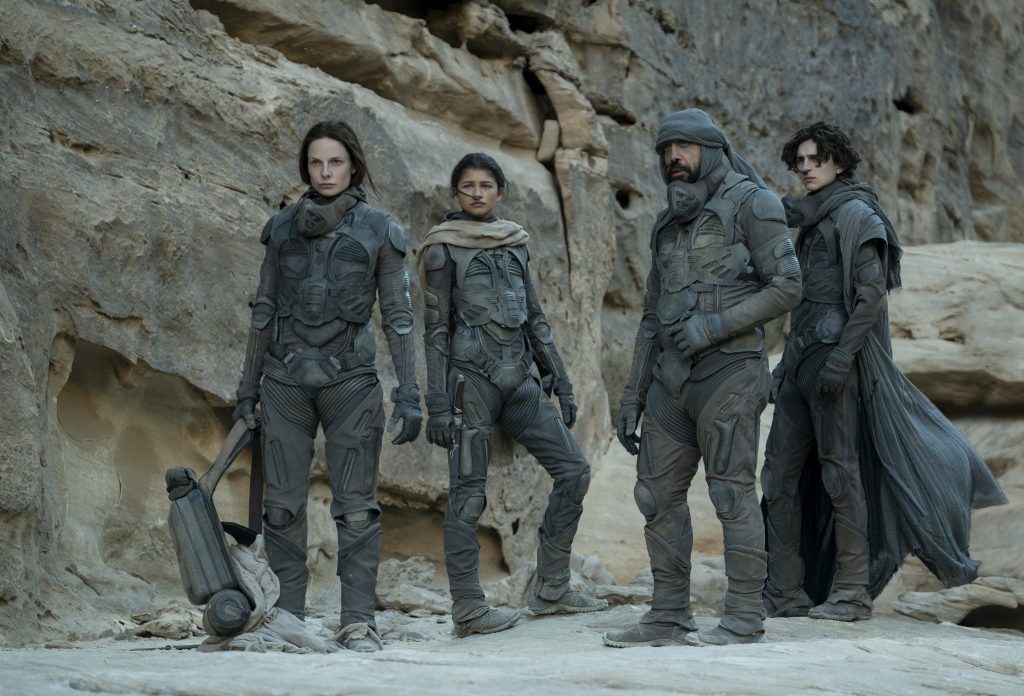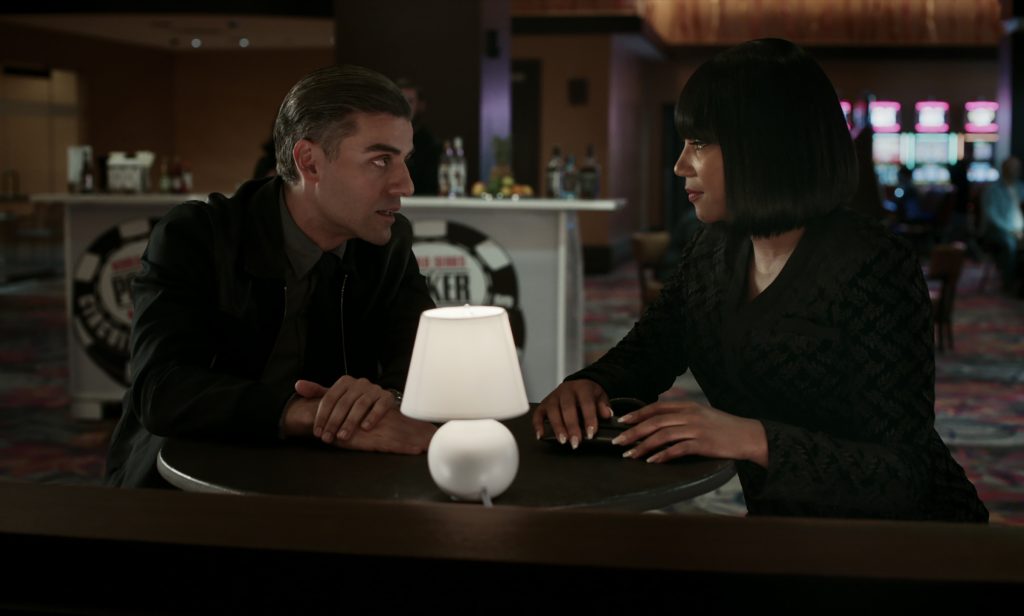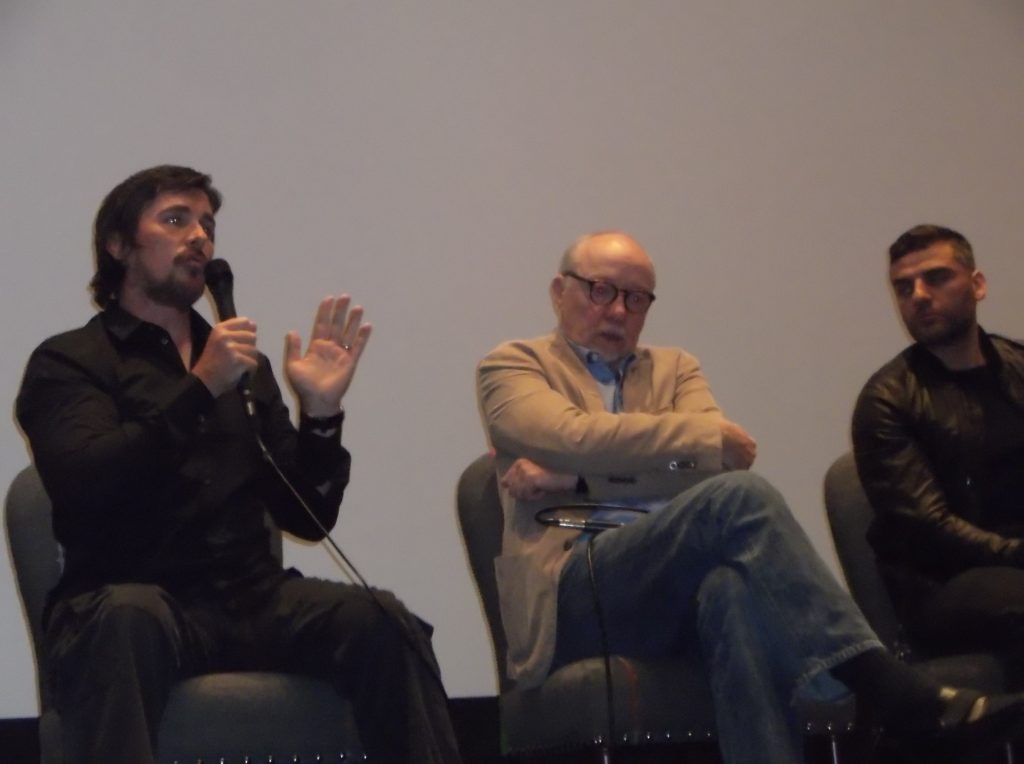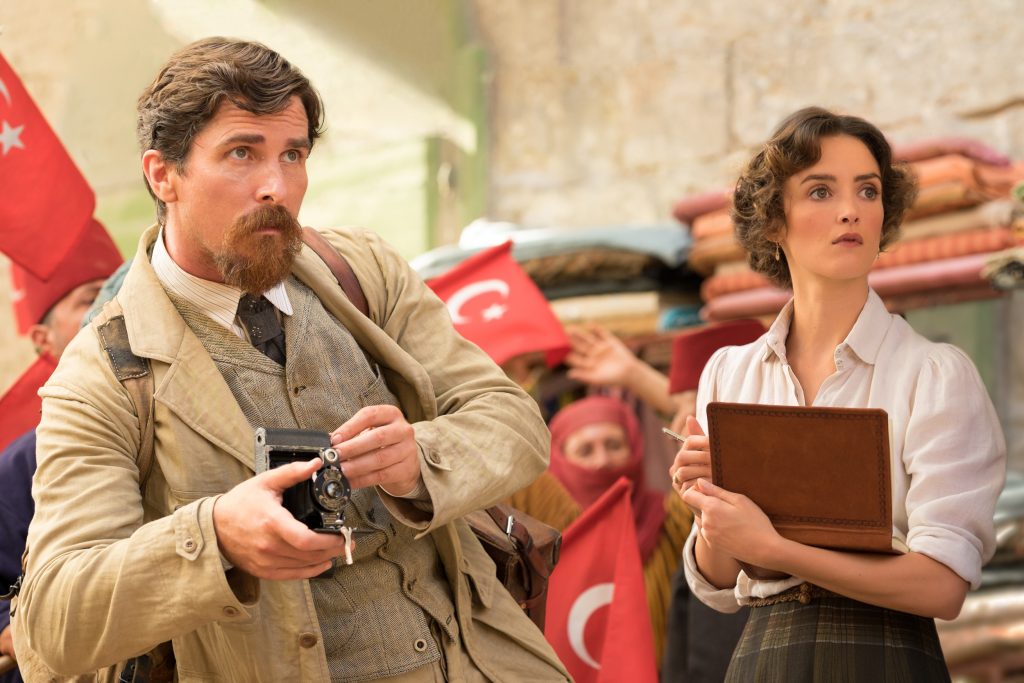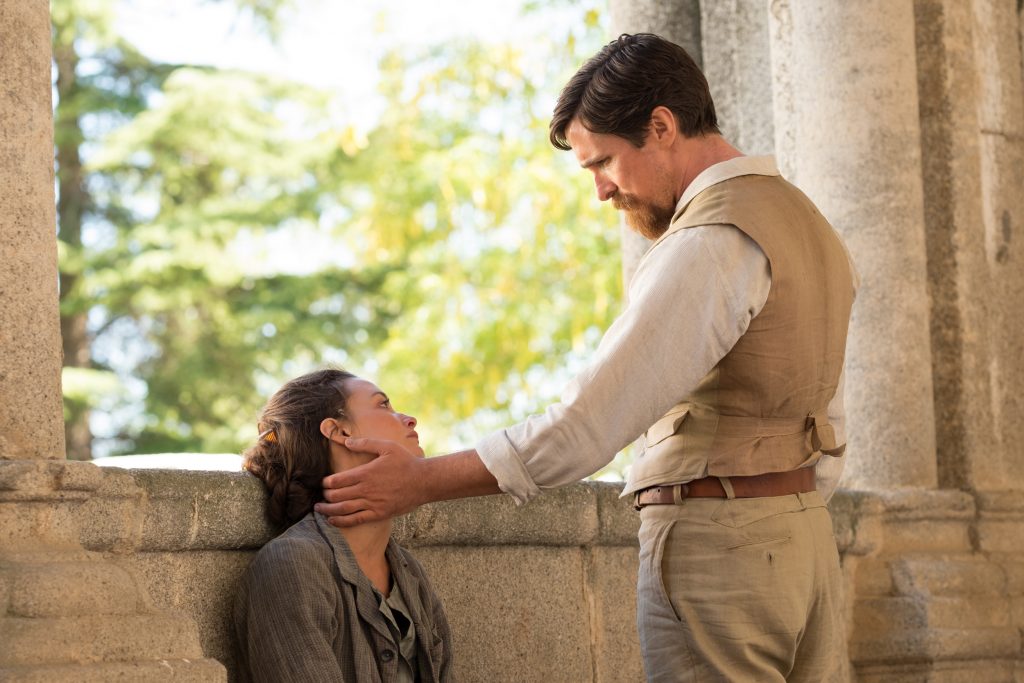May 31, 2023
by Carla Hay

“Spider-Man: Across the Spider-Verse”
Directed by Joaquim Dos Santos, Kemp Power and Justin K. Thompson
Some language in Spanish with no subtitles
Culture Representation: Taking place in New York City and in the fictional multiverse called the Spider-Verse, the superhero animated film “Spider-Man: Across the Spider-Verse” features a racially diverse cast of characters (black, white and Latino) representing the working-class and middle-class.
Culture Clash: American teenager Miles Morales, who is one of many spider characters in the Spider-Verse, encounters various heroes and villains in the Spider-Verse.
Culture Audience: Besides appealing to the obvious target audience of comic book movie fans, “Spider-Man: Across the Spider-Verse” will appeal primarily to people who don’t mind watching animated movies that have an inconsistent visual style and a very muddled plot.

Just like a tangled web from a scatterbrained spider, “Spider-Man: Across the Spider-Verse” is a convoluted mess. This overstuffed movie takes too long to define the plot. It’s a barrage of inconsistent visuals that often look like ugly comic-book graffiti. And it’s a huge disappointment as a sequel to 2018’s Oscar-winning “Spider-Man: Into the Spider-Verse” (based on characters from Marvel Comics), a visually stunning, highly entertaining film that showed tremendous potential as the next great “Spider-Man” movie series. Superhero movies are supposed to tell viewers within the first 30 minutes what the story is going to be about and who the villain is, but the 140-minute “Spider-Man Across the Spider-Verse” fails to deliver those basic elements until the movie is more than halfway done.
“Spider-Man Across the Spider-Verse” (directed by Joaquim Dos Santos, Kemp Power and Justin K. Thompson) also commits one of the worst sins of a movie sequel: It’s very unwelcoming to newcomers. People who didn’t see or don’t know what happened in “Spider-Man: Into the Spider-Verse” will be confused from the very first scene of “Spider-Man: Across the Spider-Verse.” And even if viewers saw and remember “Spider-Man: Into the Spider-Verse,” they will have their patience tested by how the overly long “Spider-Man: Across the Spider-Verse” jumps from one subplot to the next without much explanation or resolution. Characters appear, disappear for long stretches of time, and then might or might not reappear with any meaningful context on what they’re really supposed to be doing in this movie.
In “Spider-Man: Across the Spider-Verse,” Miles Morales, also known as web-slinging superhero Spider-Man (voiced by Shameik Moore), is a student in his last year of high school. Miles is the movie’s central character, and he seems to be just as confused by what’s going on in his world as many viewers will be. Miles (who lives in New York City’s Brooklyn borough) is one of several people or creatures who have a Spider superhero alter ego. In the Spider-Verse, these various Spider iterations can time jump and appear in other universes, depending on if they have the power to do so, or are sent there by someone else. Unlike the teenage Peter Parker in the “Spider-Man” franchise, or even the Miles Morales in “Spider-Man: Into the Spider-Verse,” the Miles in “Spider-Man: Across the Spider-Verse” is barely shown in school or interacting with his schoolmates.
That’s not what’s irritating about this movie. What’s irritating about “Spider-Man: Across the Spider-Verse” is that it’s so enamored with the concept of various Spider beings, it overloads in introducing these characters but doesn’t have much real character development for them. There are moments of wisecracking jokes (the movie’s comedy is best appreciated by teenagers and adults), but these quips don’t make up for the rest of the uninspired plot and dialogue. And the movie’s big climax just drags on and on, like a rambling stand-up comedian who doesn’t know when to get off the stage.
Miles’ main ally in “Spider-Man: Across the Spider-Verse” is Gwen Stacy (voiced by Hailee Steinfeld), a teenager who’s close to Miles’ age and who might or might not be his love interest. Gwen has a superhero alter ego named Spider-Gwen, who was the last person known to see the adult Peter Parker (voiced by Jake Johnson), also known as the most famous Spider-Man, before Peter died. (This death scene is shown as a flashback of Spider-Gwen at Peter’s side when he dies in a massive urban wreckage.) Gwen’s widower father George Stacy (voiced by Shea Whigham), who’s had a rocky relationship with Gwen, is determined to arrest Spider-Gwen, not knowing that his daughter is really Spider-Gwen.
“Spider-Man: Across the Spider-Verse” has such a poorly constructed narrative, the only backstory that viewers get about Gwen is her vague voiceover narration in the movie’s opening scene: “I didn’t want to hurt him, but I did. He’s not the only one.” After the flashback of Parker Parker dying in the wreckage, Gwen says in a voiceover: “I never really made another friend after that—except one, but he’s not here.” That other friend, of course, is Miles Morales. But only Spider-Man experts or people who saw “Spider-Man: Into the Spider-Verse” will know what Gwen is babbling about in this opening scene.
Gwen is the drummer for an all-female rock trio called the Mary Janes. (The band’s name is a cheeky nod to Mary Jane Watson, who is Peter Parker’s girlfriend in other “Spider-Man” stories.) The beginning of the movie shows the band rehearsing and then Gwen quitting in anger. Why? Don’t expect a good explanation, except she appears to be angry over Peter’s death but she can’t talk to anyone about it. It’s a scene that’s ultimately pointless, like many other scenes in this long-winded film.
After her temper tantrum, Gwen goes home, where she has a bratty attitude with her father, who tells her that the police have gotten a break in the Peter Parker/Spider-Man death case. George says to Gwen: “Too punk rock to hug your old man?” She then quickly hugs him, and all seems to be forgiven. But as soon as you know that George and his police colleagues have made progression in their Peter Parker death investigation, you know what’s eventually going to happen.
“Spider-Man: Across the Spider-Verse” also shows that Miles’ home life is affected by his superhero antics. A lot of time in this movie is spent on repetitive and not-very-interesting subplots about Miles’ parents—Jefferson Davis (voiced by Brian Tyree Henry) and Rio Morales (played by Luna Lauren Velez, previously known as Lauren Velez)—getting annoyed and worried because Miles is constantly tardy or absent from places where he needs to be. A running “joke” in the movie is that Miles’ parents keep adding to the number of months that they say Miles is grounded.
Miles pops in and out of a meeting that he’s supposed to have with his parents and his school principal (voiced by Rachel Dratch) to discuss his plans after high school. The principal is worried that Miles might be squandering his potential, since he’s been skipping classes. And there are some racist overtones when the principal says she wants to fabricate a narrative for Miles’ college applications by saying on the applications that Miles (who is Afro-Latino) is a poor, underprivileged kid with a rough childhood. (He’s not. Miles actually comes from a stable middle-class family.) Fortunately, the principal’s awful idea is nixed.
In the meeting, it’s mentioned that Miles wants to go to Princeton University to study physics. Rio gets upset because she thinks New Jersey is too far away from Brooklyn. (It’s not.) And then, Miles is out the door before the meeting is over because he has to attend to some secretive Spider-Man superhero business. His plans for what he wants to do after graduating from high school are never mentioned again in the movie. It’s just a time-wasting scene.
n “Spider-Man: Into the Spider-Verse,” Miles’ relationship with his parents looks authentic. In “Spider-Man: Across the Spider-Verse,” Miles’ relationship with his parents looks fake and rushed. There’s a very disjointed sequence where Miles is late for a rooftop party that his family is having to celebrate Jefferson getting promoted from lieutenant to captain at the New York Police Department. The death of Jefferson’s thieving criminal brother Aaron, which was shown in “Spider-Man: Into the Spider-Verse,” is treated as an quick afterthought in “Spider-Man: Across the Spider-Verse.” Miles introduces Gwen to his parents in this rooftop party sequence, which keeps getting interrupted by Gwen and Miles going in and out of the Spider-Verse.
During this very sloppily told and often visually unappealing movie, other characters show up, disappear, then show up again, and might disappear again, with the movie never clearly defining who some of them are and what is purpose of these characters. A villain who comes and goes with no real significance is Adrian Toomes, also known as The Vulture (voiced by Jorma Taccone), who gets into a battle with Spider-Gwen. Don’t expect the movie to give an explanation of who The Vulture is and where he came from, because it’s never mentioned in “Spider-Man: Across the Spider-Verse.”
Miles later thwarts a convenience store robbery by Jonathan Ohnn, also known as The Spot (voiced by Jason Schartzman), a portal-jumping villain character with a black hole for a face and who looks like he’s wearing a white full body suit with Dalmatian patterns. The Spot appears and disappears into portal holes, with no explanation for viewers who aren’t familiar with this character from Marvel comic books. The only clue offered is when The Spot tells Miles, “I’m from your past.”
Other characters who are dropped in and out of scenes are Miguel O’Hara (voiced by Oscar Isaac), a mysterious motorcycle-riding character dressed in a Spider-Man costume; Jessica Drew (voiced by Issa Rae), a no-nonsense, highly trained fighter who happens to be pregnant; and Lyla (voiced by Greta Lee), who is Miguel’s artificial-intelligence assistant. A version of the adult Peter Parker shows up, as a married father of a baby daughter named Mayday, who seems to fill the movie’s quota to have a cute kid character in the movie. A LEGO universe is briefly shown as nothing more than product placement for LEGO.
There are also international versions of Spider superheroes. Hobart “Hobie Brown,” also known as Spider-Punk (voiced by Daniel Kaluuya), is a snarling, sarcastic Brit who seems to be influenced by a 1980s-era Billy Idol. Spider-Punk is the only character who does not have a non-generic personality. Margo Kess, also known as Spider-Byte (voiced by Amandla Stenberg), is an American, openly queer computer expert, whose presence in the movie barely makes a difference to the story. Ben Reilly, also known as Scarlet Spider (voiced by Andy Samberg), is a clone designed to look like Peter Parker. Spider-Man India (voiced by Karan Soni) doesn’t even get his own birth name in the movie, which gives him a brief, goofy appearance that reeks of tokenism.
Some of the movie’s animation is deliberately made to look like unfinished sketches from a comic book. There might be some people who like this visual style, but most viewers of superhero movies want to see consistency in the animation style of movies in the same series. “Spider-Man: Into the Spider-Verse” and in “Spider-Man: Across the Spider-Verse” have almost entirely different teams of screenwriters and directors—and these difference show to the movie’s detriment. Bob Persichetti, Peter Ramsey and Rodney Rothman directed “Spider-Man: Into the Spider-Verse,” which was written by Rothman and Phil Lord. “Spider-Man: Across the Spider-Verse” was written by Lord, Christopher Miller and Dave Callaham.
There are huge parts of the “Spider-Man: Across the Spider-Verse” that look like an experimental art project gone wrong. The animation sometimes look jagged, unpolished and blurry. As for the movie’s unfocused plot, it looks like it was made only for the type of people who know Spider-Man inside jokes or who religiously look for Easter Eggs in “Spider-Man” visual content. A typical family with children under the age of 10 who see this movie will probably feel alienated by how so much of the film is cluttered and unclear. And it begs the question: “Why mess up such a good thing?”
Not all of the visuals in “Spider-Man: Across the Spider-Verse” consists of animation. There are a few Spiderverse scenes where people appear as cameos in live-action visuals. Donald Glover has one of these cameos. (In real life, Glover famously campaigned to get the role of Peter Parker/Spider-Man in the early 2010s. Andrew Garfield ended up getting the role.) Another cameo is from sassy convenience store owner Mrs. Chen (played by Peggy Lu), who is a minor character in the “Venom” movies, which are connected to the “Spider-Man” franchise. People who haven’t seen the “Venom” movies just won’t know or care about this Mrs. Chen cameo. These cameos are nothing more than stunt casting and add nothing to the plot.
It seems like “Spider-Man: Across the Spider-Verse” is trying to be an artsy superhero animated film. The problem is that the “Spider-Man” movie brand was made for a wide variety of people, not just comic-book enthusiasts who are obsessive about Spider-Man “canon,” which in comic-book terms means the story as it was originally presented in the comic books. The movie has an annoying tendency to assume all viewers are going to be Spider-Man experts.
And speaking of “canon,” expect to hear a lot of about “canon disruption” in “Spider-Man: Across the Spider-Verse.” Pity any viewer of this steaming pile of pretentiousness who doesn’t have encylopedic knowledge of what is and what is not “canon” in the Spider-Verse. Because yes, “Spider-Man: Into the Spider-Verse” is a very pretentious animated film that is sure to baffle and disappoint many people who think they’re going to see a continuation of what made “Spider-Man: Into the Spider-Verse” so special.
Anyone who’s letting children under the age of 10 watch the very messy “Spider-Man: Across the Spider-Verse” should be warned that these children will most likely be bored and/or confused, unless all they care about is seeing bright, splashy visuals on screen. The voice cast members for “Spider-Man: Across the Spider-Verse” do what they’re supposed to do. But the plot is so jumbled and smug with its fan-service pandering, by the time the end of “Spider-Man: Across the Spider-Verse” announces that the story continues in “Spider-Man: Beyond the Spider-Verse” (due out in 2024), many viewers will be thinking to themselves: “No, thank you.”
Columbia Pictures/Sony Pictures Animation will release “Spider-Man: Across the Spider-Verse” in U.S. cinemas on June 2, 2023.

